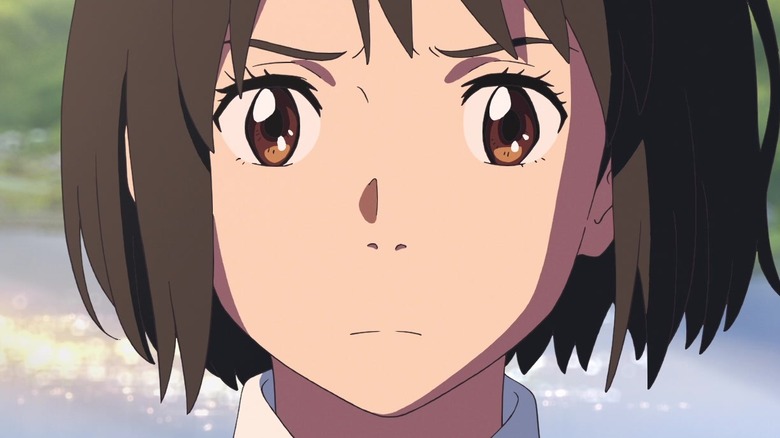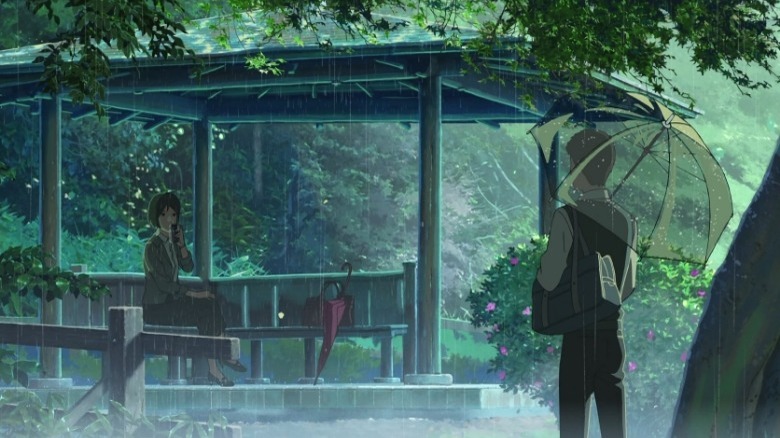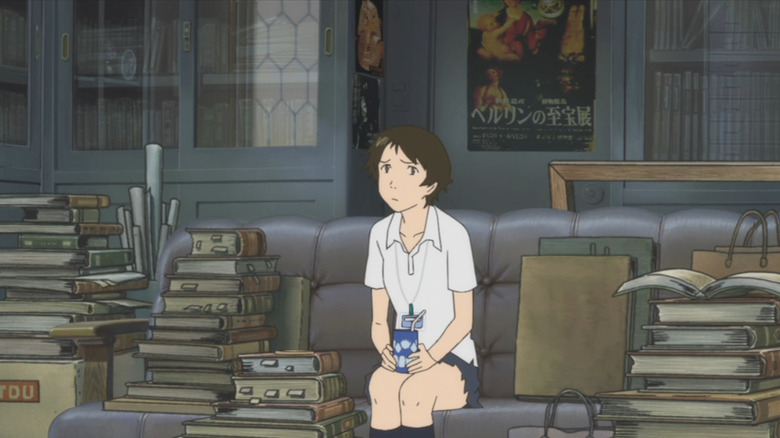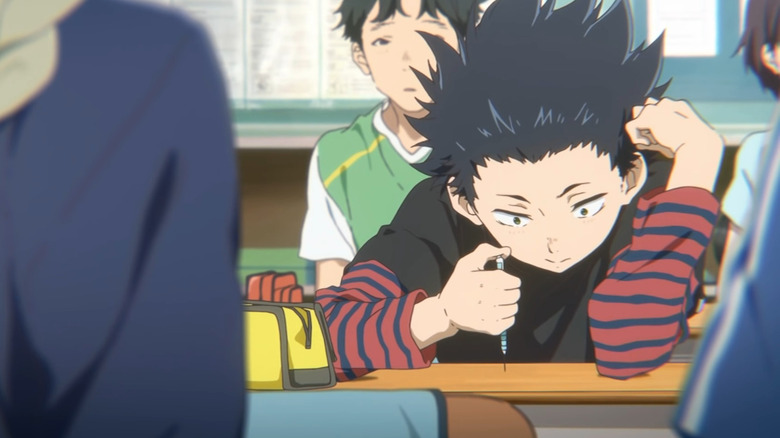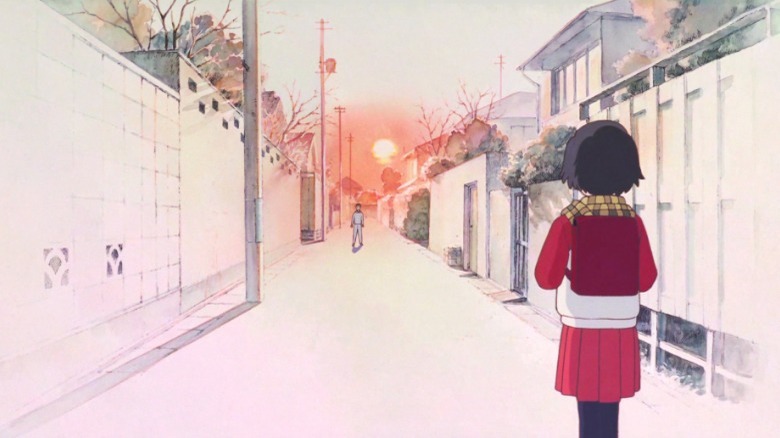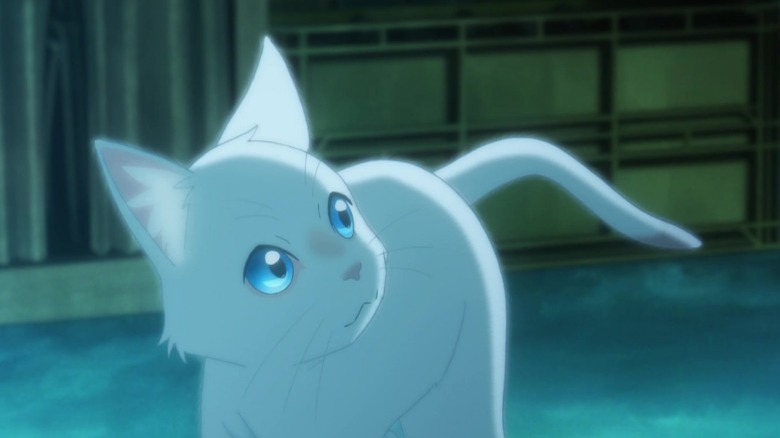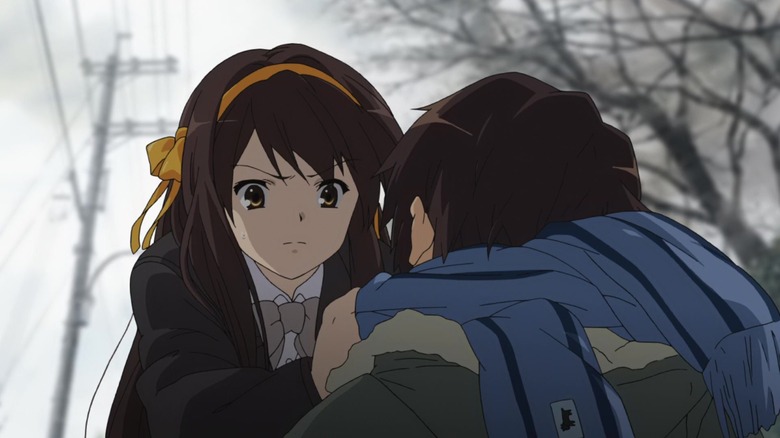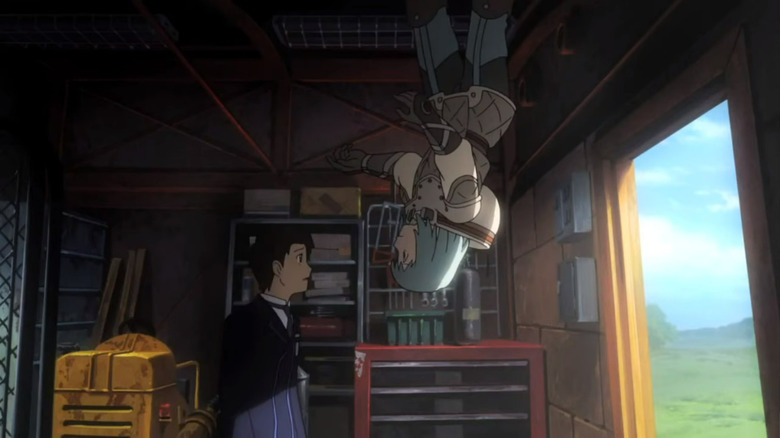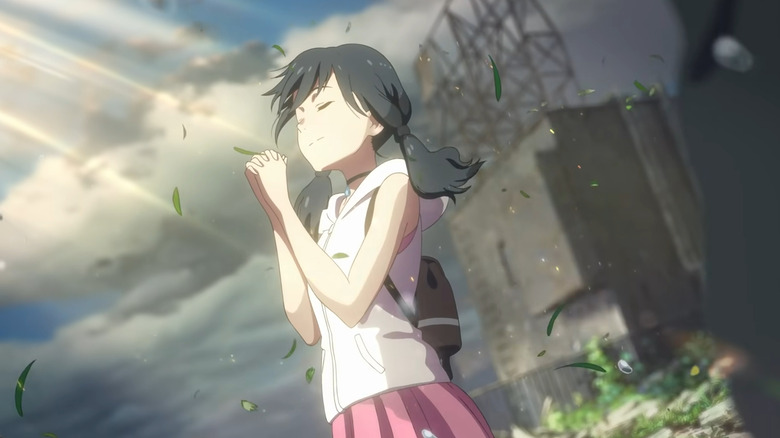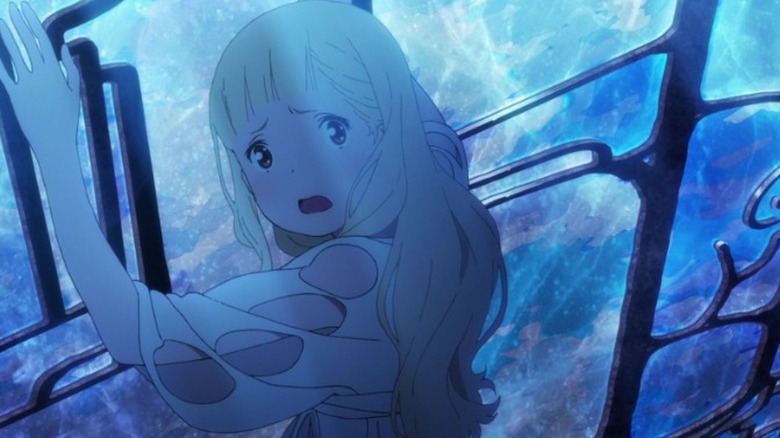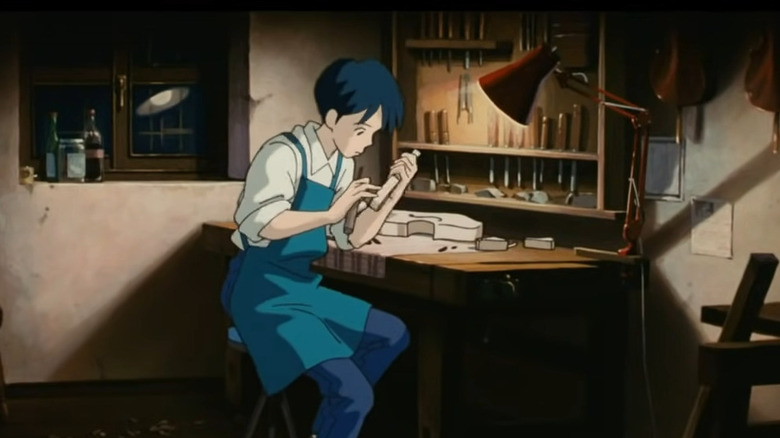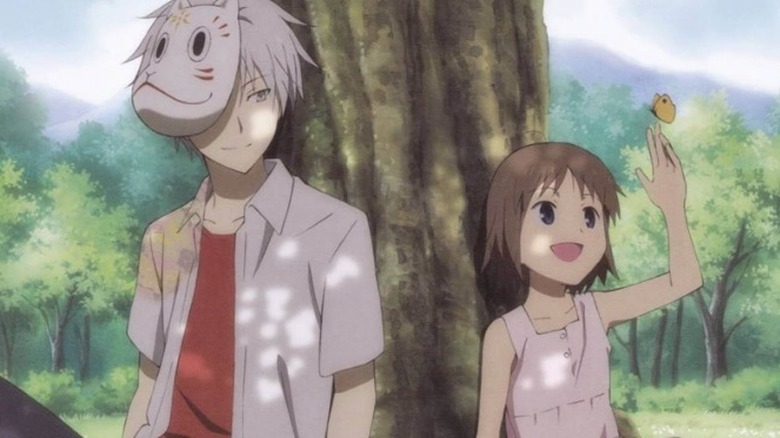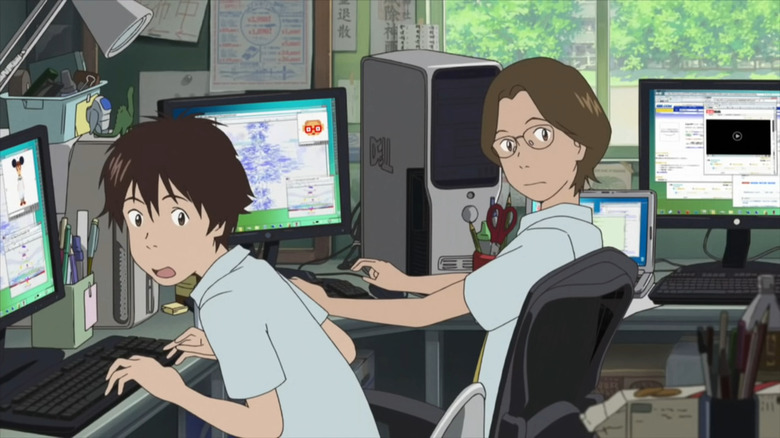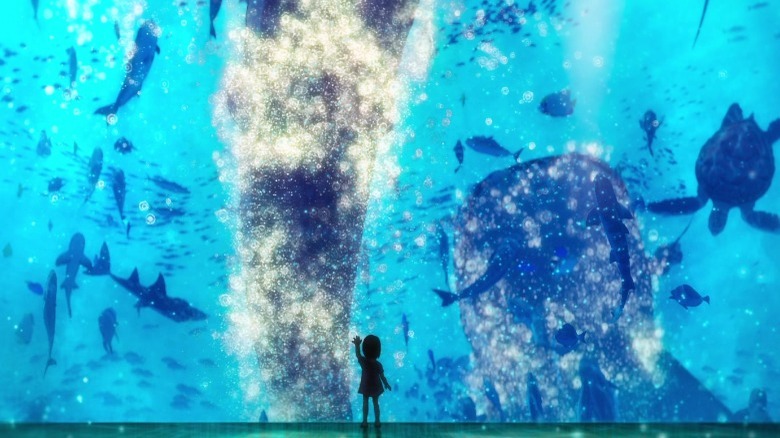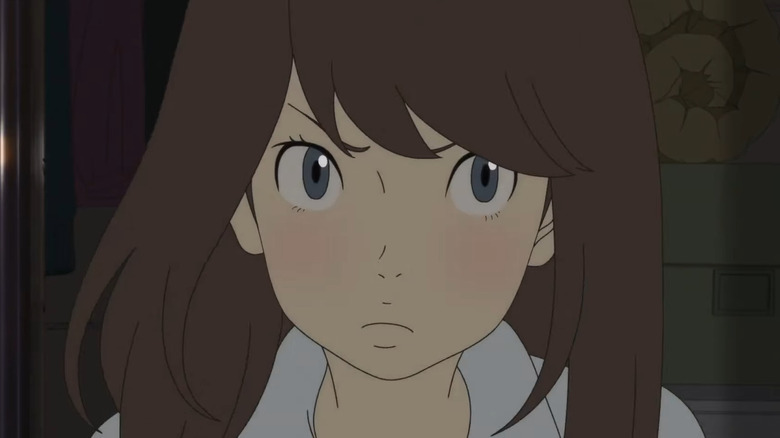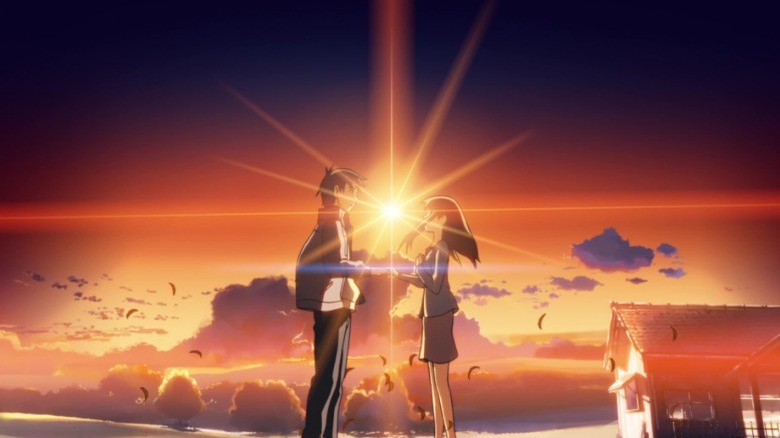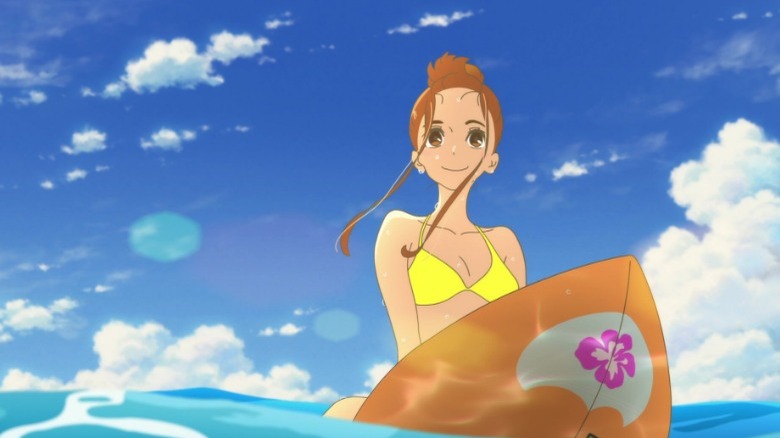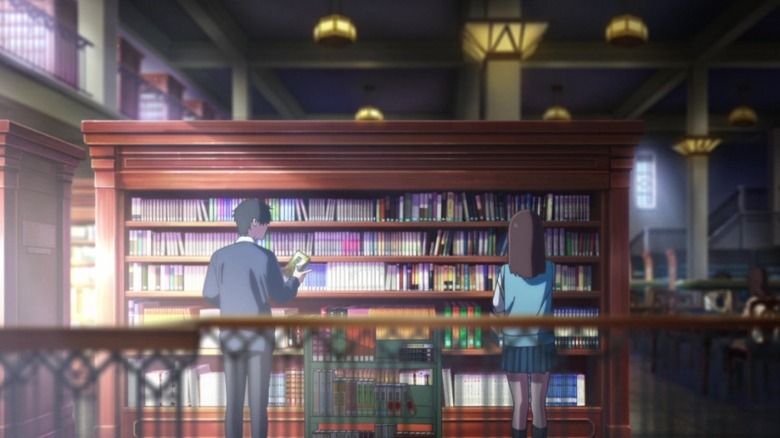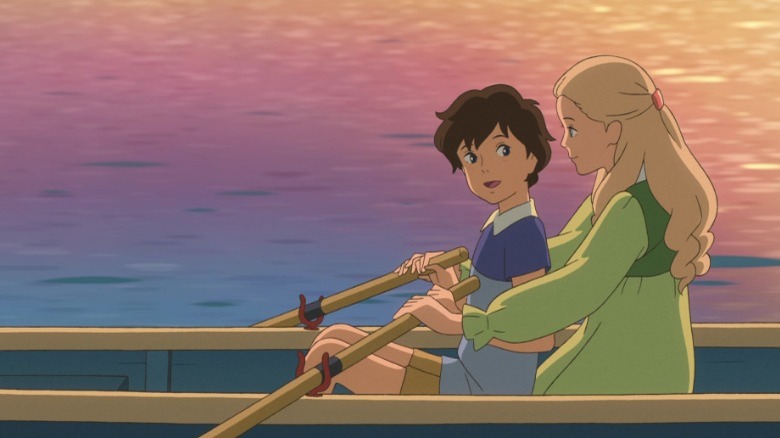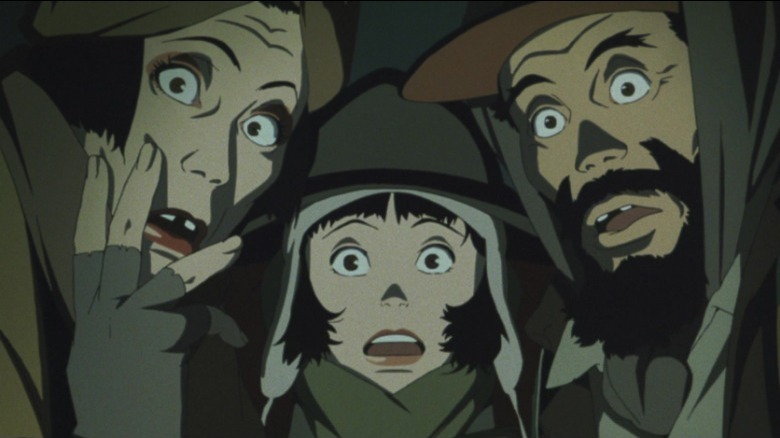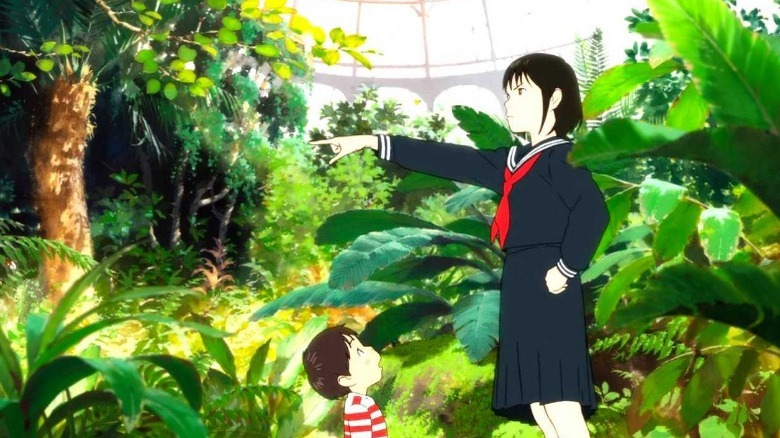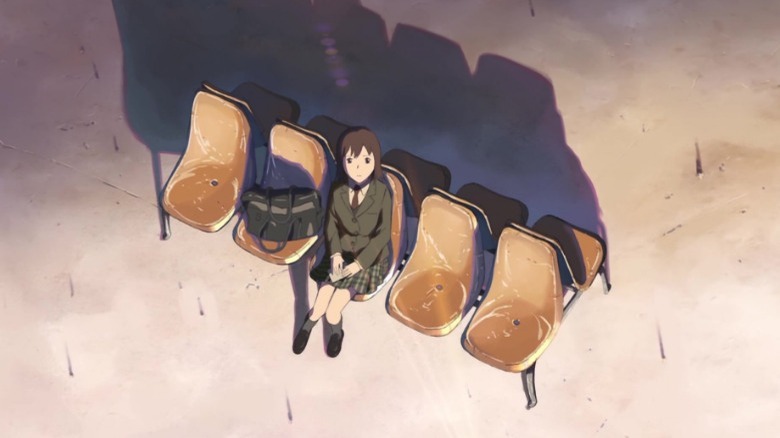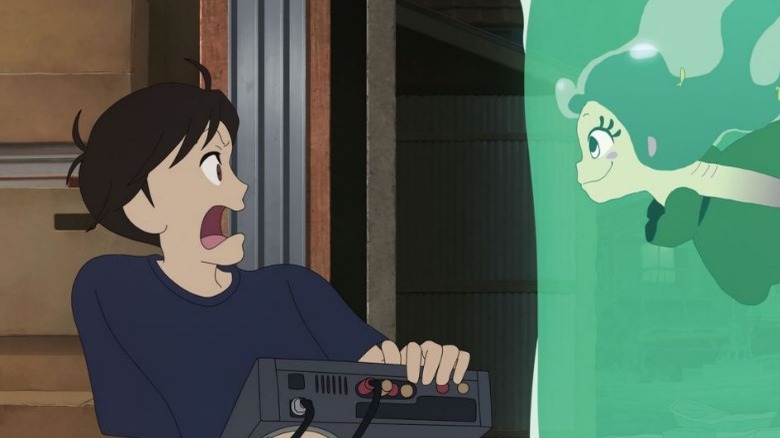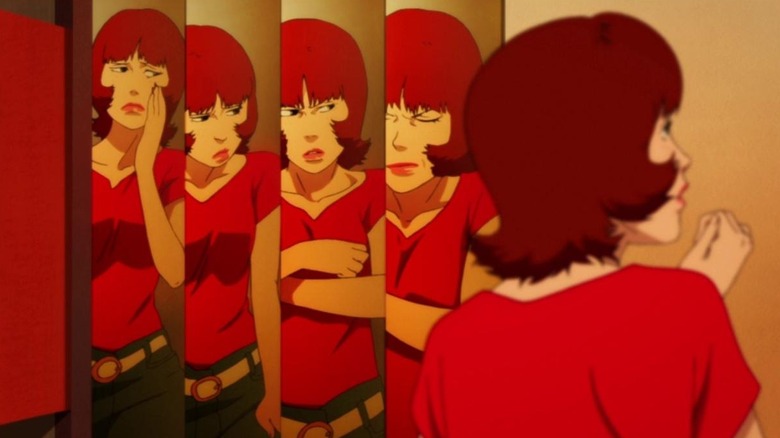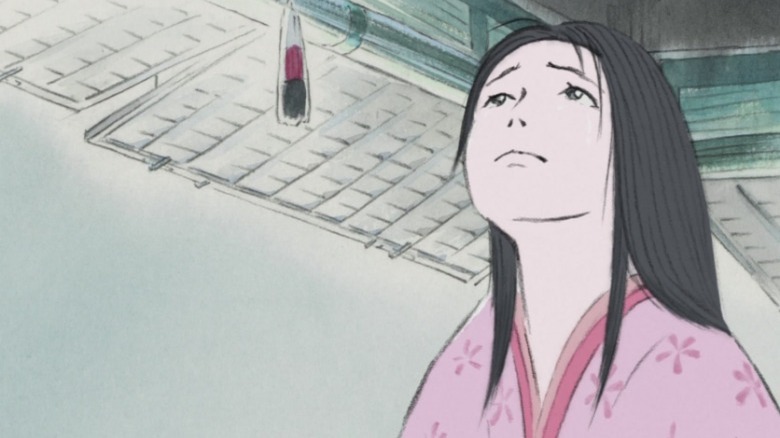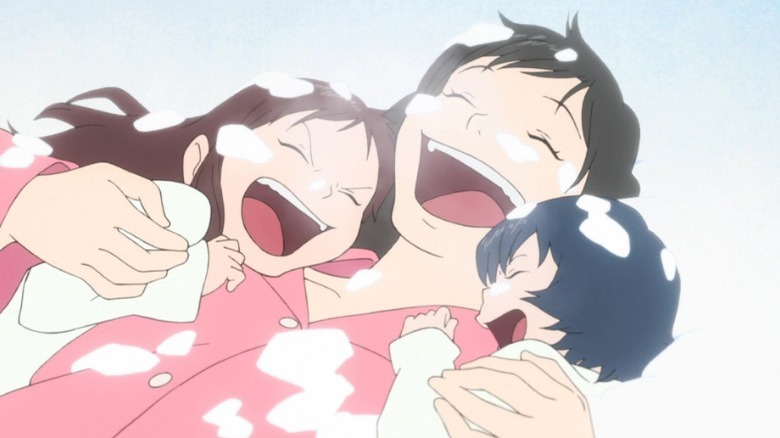25 Great Movies Like Your Name Every Anime Fan Needs To Watch
"Your Name," Makoto Shinkai's 2016 anime fantasy about two teenagers who inexplicably begin to swap bodies, is a truly great movie. Its luminous animation, stirring romance, charming sense of humor, and unique plot won it plenty of awards and a deluge of positive reviews. Given its genre-blending nature, this is especially impressive. Many anime productions strictly adhere to their genre's hallmarks, whether they're high-energy shonen series aimed at young boys or dewy-eyed romances. But "Your Name" combines suspense, humor, romance, action, and science fiction into one unforgettable movie. Young Taki and Mitsuha face their own feelings, a comet that threatens to wipe out an entire town, time travel, and familial tension.
If you love "Your Name," you might very well be concerned you'll never find anything else like it. But you needn't worry: The world of anime offers plenty of options for even the pickiest viewer. From fairy tale tragedies to magically realist coming-of-age tales, these are 25 anime movies every fan of "Your Name" should watch next.
The Garden of Words
"The Garden of Words" is a perfect movie for fans of "Your Name" for one simple reason: Both films were directed by Makoto Shinkai. His touch is obvious — the colors are just as vibrant, and the animation is just as fluid. Most importantly, though, "The Garden of Words" captures the same feeling of longing that Taki and Mitsuha experience when they're separated by time and distance.
Every Shinkai movie has this distinctive yearning in common: As YouTuber Analog Drift observed, the director is fascinated by what separates people who are drawn to each other. Sometimes it's a physical obstacle, and sometimes it's a more figurative kind of separation. In "The Garden of Words," it's not a comet keeping the two romantic leads apart. Instead, the biggest barrier to their love is their age difference.
Takao is a 15-year-old boy who dreams of becoming a shoemaker, while Yukari is a 27-year-old teacher who spends rainy days with him at the park. Takao falls in love with Yukari, but of course, she sees him as a kid. A relationship can never happen between them, which Takao must poignantly face. But that doesn't mean that what they share isn't meaningful. Moreover, if you love the beautifully-rendered scenes of nature in "Your Name," there's plenty more of that here. Even something as simple as a tree branch is animated with spectacularly detailed care.
The Girl Who Leapt Through Time
Like "Your Name," "The Girl Who Leapt Through Time" uses magical realism to explore the most awkward and heartfelt moments of teen love. When 17-year-old Makoto discovers she has the ability to leap backwards in time, she does what any high school student would do: She uses her gifts to eat the last pudding in her family's fridge. Soon, Makoto starts relying on time travel for everyday tasks like finishing her homework early or stealing extra time at the karaoke machine. She even uses it to erase her best friend Chiaki's love confession.
For a while, she's blissfully unaware of the consequences that are rippling outward from her choices. But eventually, just like Taki and Mitsuha, Makoto and Chiaki must fix the timestream lest human lives be lost ... even if it means permanently losing their chance to be together. It's rare to see a movie that simultaneously manages to be cute and mature, but "The Girl Who Leapt Through Time" achieves that balance effortlessly. Notably, it was directed by Mamoru Hosoda, the first anime director not from Studio Ghibli to be nominated for an Academy Award.
A Silent Voice
If any anime film has an ending that comes close to capturing the bittersweet note "Your Name" concludes on, it's "A Silent Voice." There's also a romance at the core of "A Silent Voice," but this film, like "Your Name," is far more than just a love story. When Shoya was younger, he bullied a deaf classmate named Shoko. Now, Shoya is an adolescent outcast, tormented by guilt and bullied by others. He decides it's not too late to make amends with Shoko, and — to his surprise as much as anyone's — he extends a hand in friendship. But soon enough, he discovers that it will take a lot more than that to fix the damage he has done.
"A Silent Voice" crafts a particularly beautiful soundscape, featuring swelling music and haunting silence at exactly the right moments. It also boasts an astounding sense of empathy. "A Silent Voice" considers every character's point of view, from redemption-seeking Shoya to Shoko's mother, who will do anything to prevent her daughter from being hurt again. Although there's no body-swapping involved, viewers will certainly leave the theater feeling like they've been firmly planted inside the heads of these vibrant characters.
Only Yesterday
It took until 2016 for this Studio Ghibli classic to get an English dub, according to Polygon, but it was well worth the wait. "Only Yesterday" is a sweet love story set against a beautiful rural backdrop, a premise "Your Name" fans will find familiar. But Taeko, our 27-year-old protagonist, is a grown woman — and a very unique one at that. Rather than spend her vacation traveling to a spa or relaxing at home, she decides to go to a farm and harvest safflower. Along the way, she meets the charismatic Toshio and reminisces about childhood experiences she can't seem to let go of.
"Only Yesterday" is not a fast-paced movie, but it's never boring — in fact, it's absolutely mesmerizing. Like "Your Name," the mood ranges from playful (like when young Taeko spends weeks practicing just so she can recite a single line in a school play) to melancholy (like when she recalls a boy she teased once in school and never saw again). Pairing whimsical childhood anecdotes with the mundane details of Taeko's adult life really makes this film soar, and sets it apart from most teen-centric anime romances. It's also utterly gorgeous: "Only Yesterday" will make you fall in love with the Japanese countryside. Plus, the quiet but uplifting ending might give Taki and Mitsuha's reunion scene a run for its money in terms of sheer emotion.
A Whisker Away
Young Miyo is seen by her classmates as loud and confident, especially when she makes clumsy passes at her crush, Hinode. However, she's secretly insecure. That's why, when a mysterious merchant offers her a magical mask that allows her to transform into a cat, Miyo seizes the opportunity. As a stray kitty, she can get close to Hinode in an entirely new way.
Like "Your Name," "A Whisker Away" is a teen romance with a fantastical twist, which gives the protagonist intimate glimpses of their love interest's personal life. (Also like Taki and Mitsuha, this sometimes leads to questionable invasions of privacy.) The movie hits a tonal sweet spot between playful quirkiness (like when a cat gets its paws on a mask that allows it to turn into a person) and serious sincerity (like when it becomes clear that Miyo is spending more and more time as a cat to escape her problems at home). Polygon argues that this is the reason why "A Whisker Away" works so well. If it were simply a cute love story, it would be fun, but forgettable. But it's much, much more than that, which makes it a perfect choice for anime fans looking to follow up "Your Name."
The Disappearance Of Haruhi Suzumiya
Haruhi Suzumiya, a teen girl who has the ability to subconsciously manipulate space and time, is one of the most powerful anime characters ever created. She doesn't know she's essentially godlike, but her friends do. Thus, they work overtime to keep her from destroying reality. Most of this is covered in "The Melancholy of Haruhi Suzumiya," which is, admittedly, pretty essential to watch before tackling the associated movie, "The Disappearance of Haruhi Suzumiya." But once you take the time to dive in, you won't be disappointed.
In "The Disappearance of Haruhi Suzumiya," Kyon, one of Haruhi's friends, wakes up in an alternate universe where he never met her, and their friend group doesn't exist. Kyon must find Haruhi and figure out a way to get their old lives back — but what can a random high schooler do to change a teen deity's actions?
The tone of this film is drastically different than that of the series. The latter is full of zany, over-the-top plotlines, while the former is more grounded and takes the time to get viewers emotionally invested in the characters. Ironically, this makes it much more melancholy than "The Melancholy of Haruhi Suzumiya." It also makes it a perfect match for fans of "Your Name." If you enjoy the moment Taki gets the rug yanked out from under him, then you'll love this film, which is full of poignant gut-punches.
Patema Inverted
In "Your Name," Taki and Mitsuha might as well live in two different worlds. Taki enjoys the fast-paced environment of downtown Tokyo, while Mitsuha lives in a quiet rural town and has never so much as visited a café. The romantic leads of "Patema Inverted" also come from very different backgrounds, though the differences are much more extreme. For Patema and her clan, gravity is reversed. Her family warns her not to leave their underground home, lest she fall into the sky. Meanwhile, Eiji lives on the surface, where everybody tells him he shouldn't trust "inverts" like Patema. The two team up and try to convince both sides to overcome their prejudice. Along the way, they discover a shocking secret about their two worlds.
"Patema Inverted" is a fast-paced sci-fi anime with some fascinating philosophical implications. Unlike many films on this list, it boasts many inventive action scenes that are sure to give you vertigo. If that doesn't leave your head spinning, then your mind will certainly be blown by a plot twist that rivals the time travel reveal in "Your Name." And hey, fun fact: Eiji's English voice actor, Michael Sinterniklaas, also voices Taki.
Weathering with You
In "Your Name," Taki and Mitsuha try to save everyone from a comet, knowing they'll probably forget each other forever. Given a choice between the world and their relationship, they both choose the world. But "Weathering with You" takes a different route. This film explores the cost of giving up yourself for others' sake.
Teenage runaway Hodaka is struggling to make it on his own in Tokyo when he meets Hina, a girl who has the ability to transform a rainy day into a sunny one. But there's a catch: She loses a piece of herself each time this happens. They decide to monetize this power, but are soon overwhelmed — and then social services gets involved.
"Weathering with You" is another film from "Your Name" director Makoto Shinkai, and it certainly bears his signature stamp. This is another acute exploration of the bonds between two people who seem destined to never be together. The environments they traipse through are just as gorgeous as those of "Your Name" as well, right down to the intense colors and gleaming reflective surfaces. Not since "Ponyo" has a flooded town looked so awe-inspiringly beautiful.
Maquia: When the Promised Flower Blooms
At a glance, it seems like "Maquia: When the Promised Flower Blooms," an out-and-out fantasy film, has nothing in common with "Your Name." But like Taki and Mitsuha's story, this tale explores something anybody can relate to — the pain of watching your kids grow up — through fantastical means. Maquia belongs to a race known as the Iorph. Her lifespan extends far beyond that of a human, so her fellow Iorph warn her to never fall in love with one of them. But when tragedy strikes, Maquia can't help but adopt an orphaned baby named Ariel. Soon, she discovers how challenging raising a child can be — especially since she never ages, while Ariel grows all too quickly.
"Maquia: When the Promised Flower Blooms" offers everything an anime fan could want: stunning backdrops, tear-jerking music, and even some awesome dragons. Perhaps most impressively, it manages to be both huge in scope and intimate in emotion, a balance that only a handful of anime movies — including "Your Name" — manage to achieve. Both films also share a central theme: The curse of living without the person you love. Whether you're outliving your own children or simply living without the person you adore, this is one of the hardest trials life offers.
Whisper of the Heart
There are no fantastical elements in "Whisper of the Heart" — in fact, it's one of the few Studio Ghibli movies without any kind of magic. But there's still something enchanting about this warm and sincere love story. Schoolgirl Shizuku wants to be a writer but lacks the confidence to share her stories. Then, in a classic meet-cute, a boy named Seiji stumbles upon Shizuku's notebook and teases her about a song she wrote. They soon earn each other's respect and start to fall in love.
What makes "Whisper of the Heart" so sublime is that the romance is central to the story, but each lead also has the time to grow as an individual. Whenever Seiji is away in Italy, studying to be a violin-maker, Shizuku resolves to prove herself by finishing her novel before he gets back. Like "Your Name," this movie offers a nuanced portrayal of two teens in a long-distance relationship. Some of the best sequences in both movies are when the lovers are apart, each trying to find out who they are without their beloved beside them.
The Light of a Firefly Forest
Don't be fooled by the brief runtime of this movie – It packs a lot into 44 minutes. "The Light of a Firefly Forest" follows a girl named Hotaru, who falls in love with a masked spirit being named Gin. As the years fly by and Hotaru grows older, Gin stays the same. Soon, Hotaru learns that Gin is cursed to disappear forever if he ever touches a human.
Nostalgic and dreamlike, "The Light of a Firefly Forest" makes viewers care deeply about its characters in under an hour. This short length intensifies the emotions and almost makes you wish more movies opted for brevity. It's also a fitting choice for fans of "Your Name" as a story of forbidden love, where magic allows the two romantic leads to meet, but also keeps them apart. Yet, as in "Your Name," this distance is not devastating. In fact, it brings entirely new depth to the bond between ordinary girl and ageless spirit.
Summer Wars
While Taki and Mitsuha must deal with the embarrassment of switching bodies, the hero of "Summer Wars" faces an equally awkward dilemma. High school student Natsuki hires math phenom Kenji to pretend to be her fiancé in an effort to appease her great-grandmother. He's soon whisked away on a family trip, where he's pestered by nosy relatives. This experience is all the more mortifying for Kenji because he actually does have feelings for Natsuki — but then things get even worse. Kenji unwittingly unleashes a sentient computer virus into Oz, the virtual reality network society depends upon in order to function. Together, Kenji and Natsuki must outwit the virus and save the wonderful world of Oz before the virtual damage starts to have very real consequences.
Like "Your Name," "Summer Wars" offers an excellent mix of emotional storytelling and gorgeously animated action. Breathtaking martial arts battles exist seamlessly alongside messy family drama — not to mention the very real romantic chemistry of the false couple. The film even involves a lethal projectile from the sky, which might remind viewers of a certain comet over Itomori.
Children of the Sea
One of the things that makes "Your Name" so special is the fact that it actually doesn't make much sense. There's no logical explanation for why present-day Taki meets the past version of Mitsuha on the rim of the crater — but then, you don't need one. The emotional truth of this moment matters more than anything else. "Children of the Sea" takes a similar tack: As CGI director Kenichiro Akimoto told CBR while discussing the film's ending, "It's more about what you feel ... versus what your brain can logically understand."
Estranged from friends and family, teenage outsider Ruka finds herself drawn to two mysterious boys named Umi and Sora, who were raised by dugongs and now live in the aquarium where Ruka's father works. This unlikely trio soon hears a mysterious song emanating from the ocean's depths, which is somehow causing a mass migration of sea life. Ruka, Umi, and Sora must set out to discover what secrets lie within the sea ... before it's too late.
"Children of the Sea" is a visually lavish film, climaxing in a positively psychedelic ending. This aesthetic spectacle isn't just pretty, either — it's thematically resonant. Much like "Your Name," "Children of the Sea" has a lot to say about the interconnectedness of life on Earth, and even contains a plot-important comet.
Napping Princess
Taki and Mitsuha wake up from a dream they can't remember, left with only a faint sense of longing. These aren't dreams, of course, but the experiences they had when they switched bodies. If you're fascinated by the hazy barrier between dreams and reality explored in "Your Name," you might want to check out "Napping Princess," another suspenseful anime where dreams play an important role.
For Kokone, daughter of a Tokyo auto mechanic, dreams are not just dreams. The world she visits when she's asleep — a fantasy land inhabited by pirates and talking stuffed animals — parallels her real life in many surprising ways. When her father is arrested for allegedly stealing top-secret tech information, Kokone realizes her dreams may be the only way she can help him. Like "Your Name," "Napping Princess" skillfully combines 2D and 3D animation. This creates a compelling world of fantastical motorcycles, molten monsters, and self-driving cars unlike any other anime realm you've seen, wrapped in a unique and emotionally affecting story.
The Place Promised in Our Early Days
"The Place Promised in Our Early Days" was Makoto Shinkai's feature film debut. While it's not quite on the same level as "Your Name," the director's talent is still apparent within it. From his use of blinding light and deep shadows to his tendency to focus on small details of the natural world, many of Shinkai's trademarks are present. Much like "Your Name," this film is also a sweeping intersection of thought-provoking sci-fi and heartfelt coming-of-age experiences.
In an alternate version of our world where much of Japan is occupied by the Soviet Union, three high school students named Hiroki, Takuya, and Sayuri find themselves drawn to a mysterious tower. But when Sayuri goes missing, the remaining two friends abandon their dream of reaching the tower in a rebuilt plane and begin to drift apart. Years later, otherworldly phenomena begins happening near the tower. It may just be the key to finding Sayuri ... and it may destroy the world.
Like "Your Name," "The Place Promised in Our Early Days" explores people torn apart by enormous forces. It also takes a particularly intense look at the fear of forgetting those you love. What results is a gorgeous and moving tale, and a treat for Shinkai fans eager to learn more about his evolution as a creator.
Ride Your Wave
For a movie that centers around a heartbreaking death, "Ride Your Wave" is refreshingly upbeat. This colorful anime follows Hinako, a cheerful surfer with low self-esteem who wants to spend every moment by her boyfriend Minato's side. However, she finds herself alone after Minato dies in a tragic boating accident. Yet he's not completely gone: Hinako can summon Minato's spirit in any body of water. She soon becomes obsessed with keeping Minato close at all times, to the point of keeping her boyfriend's spirit in a giant inflatable porpoise. But Hinako can't ignore the truth forever. She must find the courage to move on with her life — even if that means leaving Minato behind.
"Ride Your Wave" shares quite a few story elements with "Your Name," from an annoying little sister who turns out to be an important ally to a disastrous event that the romantic leads must work together to stop. If you couldn't get enough of the romance between Taki and Mitsuha — both the highs and the lows — then "Ride Your Wave" will be of particular interest to you. Here is another cute couple with a bond not even death can break, who must nevertheless accept that loss and distance are part of life.
I Want to Eat Your Pancreas
Though its title might lead you to believe otherwise, "I Want to Eat Your Pancreas" is about terminal illness. High school outcast Haruki befriends a girl named Sakura, who is dying of pancreatic cancer. You wouldn't know it to look at her, though: Sakura is determined not to let her disease affect her positive outlook, and soon convinces Haruki to help her complete her bucket list.
In a genius reversal, the dying character is cheerful and optimistic, while her healthy partner is solemn and brooding. Better yet, Sakura's inevitable death still manages to be a surprise. If you feel dewy-eyed watching Taki and Mitsuha say goodbye, not knowing if they'll even remember each other's names after the comet falls, "I Want To Eat Your Pancreas" will move you to outright tears. Furthermore, like "Your Name," this film offers deep reflections on mortality without ever being bogged down by the weight of such a dark subject.
When Marnie Was There
"When Marnie Was There" doesn't get as much attention as Studio Ghibli's other movies. This makes sense: It's much more low-key than "Spirited Away" or "Howl's Moving Castle." Yet this movie undoubtedly continues the Ghibli tradition of lush animation, emotional music, and a story that will melt your heart. Lonely foster child Anna is whisked away to rural Japan for the summer after she suffers an asthma attack. She soon befriends a mysterious girl named Marnie. As Anna grows closer to Marnie, she begins to wonder if her newest — and only — friend might be too good to be true.
Much like "Your Name," "When Marnie Was There" begins with a deceptively simple premise that eventually reveals itself to be a complex and emotional tangle. Like Taki, Anna becomes unsure if Marnie is real or just a dream — or potentially something even stranger. The film also offers an intriguing multi-generational backstory that will remind many viewers of Mitsuha's complicated family history. Beyond all this, "When Marnie Was There" captures what it's like to be an introvert in a world of extroverts — and what it means to finally meet someone who understands.
Tokyo Godfathers
"You Name" never explains why Taki and Mitsuha start switching bodies. It doesn't need to: This staggering coincidence is far more satisfying when it's kept mysterious. Coincidences reign supreme in "Tokyo Godfathers," albeit of a very different sort. This film follows three homeless residents of Tokyo: Hana, a down-and-out trans woman who's always wanted a child of her own, Gin, a former professional cyclist fallen from grace due to his gambling problem, and Miyuki, a teen runaway. On Christmas Eve, they stumble upon an abandoned baby in a dumpster. Determined to find her parents, Hana, Gin, and Miyuki set out into the night. But each member of this unlikely family must confront their past before they manage to reunite the little one with her kin.
Simultaneously wacky and gritty, "Tokyo Godfathers" is a moving piece of magical realism (though the "magic" part might not be as overt as it is in "Your Name"). It does a particularly wonderful job humanizing the three outcasts at the center of the story, as NPR pointed out in their glowing review. Life is hard in "Tokyo Godfathers," but it's also full of mysterious benevolence. We can't completely understand it, but we can embrace it when it arrives.
Mirai
Bratty 4-year-old Kun is jealous of his baby sister Mirai ... until he meets Mirai from the future. He's soon swept up in a bizarre (and surprisingly moving) time travel adventure, which simultaneously takes him far from home and helps him understand his family with entirely new depth.
"Mirai" is sure to resonate with anybody who's ever had kids or a younger sibling: Kun forgets to pick up his toys, throws temper tantrums, and holes up in his closet, where he declares he's leaving his family forever. It's worth noting that "Mirai" is quite possibly the only movie whose climax involves the hero deciding what color pants he should wear.
This might seem like a far cry from "Your Name." But like that imaginative romance, "Mirai" offers a smorgasbord of surreal, dreamlike imagery, including a creepy train that rivals the one from "Spirited Away." Moreover, amidst all the zany time travel antics, Kun comes to better understand his parents, just like Taki discovers why Mitsuha's father is so distant from her. There's even a beautiful flying sequence guaranteed to make you appreciate the vastness of the universe.
5 Centimeters per Second
Even as they realize they've fallen in love with each other, childhood friends Takaki and Akari slowly drift apart in "5 Centimeters per Second." Eventually, they decide to meet one last time — but a delayed train and a snowstorm threaten their chance at reunion. As you've probably guessed, "5 Centimeters per Second" is a Makoto Shinkai film. Themes of separation and longing? Check. Carefully staged shots lit by blinding light? Double check. It's even got trains. In "Your Name," trains are the only thing that can bridge the distance between Mitsuha and Taki. Their reunion begins when they glimpse each other from two passing cars. But in "5 Centimeters per Second," the train keeps the two main characters apart. Can they cross that distance once more?
In some ways, "5 Centimeters per Second" feels like an alternate take on Taki and Mitsuha's story, created with considerably more downbeat intentions. If you're into moodier tales, it's entirely up your alley. But even if you're not, it's a moving and lovely story full of breathless emotion and luxurious visuals.
Lu Over the Wall
Given its boy-meets-mermaid premise, it's easy to write "Lu Over the Wall" off as another "Ponyo." However, director Masaaki Yuasa puts his own fun, innovative, and utterly distinctive spin on the classic trope. Growing up in a Japanese fishing town, young Kai wants nothing more than to escape his dull life and become a musician. His songs draw the attention of Lu, a mermaid whose fins transform into feet whenever she hears music. Kai decides to start a band with Lu and his friends Yuho and Kunio, but his town's deep prejudice against merfolk could shut them down for good. And then there's the fact that Lu and her nautical kin can't survive exposure to sunlight ...
It's impossible not to be swept up by this film's infectious sense of fun: Swivel-chair races, mer-doggies, and the most adorable animated dancing ever to grace the screen are just a few choice highlights. It's not all fluff, though. Like "Your Name," "Lu Over the Wall" explores what it's like to want to escape your tiny, boring town ... which also turns out to be the place you'd do anything to protect. Kai's village ultimately faces a major disaster, and though it isn't nearly as menacing as a comet, it still captures the eerie beauty of a dangerous force of nature.
Paprika
If you think the dreamlike imagery in "Your Name" is intense, you need to see the trippy chaos that is "Paprika." This dazzling film follows Atsuko, a scientist who is developing a device that will allow her to dive into other people's dreams in the form of her red-haired alter ego, Paprika. When this dangerous tech gets stolen by a dream terrorist, Atsuko must team up with a detective and the device's inventor to pursue the thief. But things get complicated when their dreams start to bleed into reality.
"Paprika" is gleefully psychedelic. Faces melt, people transform into mermaids, Paprika jumps through TV screens, and humans end up with squid tentacles for legs. But this thriller offers plenty of substance to go with its style. The way our heroine toggles between her real-world identity and her dream-world persona calls fascinating philosophical points to mind, much like the ones that arise from Taki and Mitsuha switching bodies. Who is the real Atsuko? What does it mean to have a "real" self? How does the dreaming mind operate? "Paprika" uses these questions as springboards into delirious and fascinating fantasy.
The Tale of the Princess Kaguya
At first glance, "The Tale of the Princess Kaguya" might seem like an outlier on this list. Visually, it looks nothing like "Your Name," favoring simple character designs and stark backgrounds. But this spare aesthetic actually enables "The Tale of the Princess Kaguya" to reach dizzying heights of artistry, emotion, and storytelling.
One day, a humble bamboo cutter named Miyatsuko finds a baby inside a luminous bamboo shoot. He and his wife adopt the "princess," as they refer to her, as their own daughter. Miyatsuko wants the best for his little girl, so when she comes of age as Princess Kaguya, he takes her to the city and showers her with riches. But in truth, she was happy in the mountains and is now miserable in her gilded cage. Along the way, Kaguya longs to be reunited with her childhood companion, Sutemaru. Like Taki and Mitsuha, these star-crossed lovers must try to reverse a fate that seems inevitable.
This film — the final work of Studio Ghibli's co-founder, Isao Takahata — is an out-and-out masterpiece. Remember the scene in "Your Name" where Taki travels back in time and gets glimpses of Mitsuha's childhood? Imagine if the intense emotions, radiant visuals, and ethereal music of that moment was an entire movie. Then, you'll have an idea of what "The Tale of the Princess Kaguya" is like — but you'll still need to see it for yourself.
Wolf Children
After her werewolf partner is killed, ordinary human Hana becomes a single mother to their half-wolf children, Yuki and Ame. As it turns out, the everyday struggles of being a single mom are doubled when the kids have claws and fangs. Sending the kids to school for the first time is an especially big source of anxiety for Hana, to say nothing of the times they get sick — Hana can't decide whether to send them to the hospital or the vet. Like many movies on this list, there's a healthy helping of romance here, first between Hana and her husband and later between Yuki and a classmate. But the characters' internal journeys are the true focus.
With its gentle aesthetic and celebration of the mundane, "Wolf Children" is a luminous delight. As in "Your Name," some of its most stunning scenes combine traditionally hand-drawn characters with CGI backgrounds. It also features a haunting score that will get under your skin, and offers glimpses of the gorgeous Japanese countryside that might even surpass the picturesque town of Itomori. "Wolf Children" is essential viewing for anyone who loves "Your Name" — or any anime fan, for that matter.
